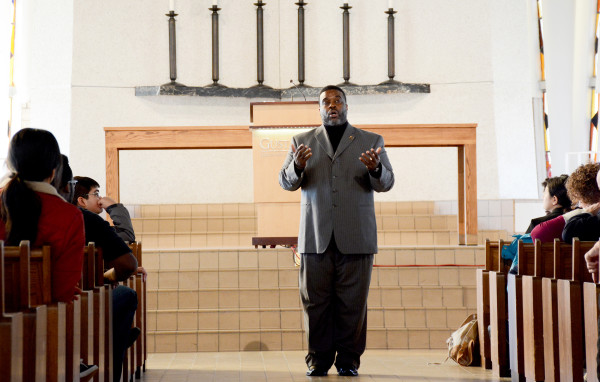Gustavus has been hosting speakers on campus to celebrate and remember the legacy of Reverend Dr. Martin Luther King Jr. since a national holiday was declared in his honor in 1986.
This year’s speaker was Reverend Dr. Jamie Washington, a pastor at a Baptist church in Maryland, a founding member of the Social Justice Institute, and founder of the Washington Consulting Group. He has over thirty years of experience working with government and higher education institutions training leaders in diversity, equity, and inclusion.
“Resistance is a part of the change process, but individuals, organizations, and communities do grow and change. There is hope.”—Rev. Dr. Jamie Washington
Director of Multicultural Programs and the Diversity Center Pearl Leonard-Rock explained why, beyond his obvious merits, Washington was chosen to be the speaker this year.
“He was chosen as a person who could bridge the civil rights movement from the 1960s to the current day by helping elders recognize their role and youth to recognize their role in today’s civil rights struggles,” Leonard-Rock said. “I believe he carries MLK’s legacy by building community. He helps individuals advocate on their behalf and give them a voice.”
Fittingly, Reverend Dr. Jamie Washington began the twenty-ninth annual MLK memorial lecture by asking everyone to stand up and greet people they did not know and to sit next to one of them for the duration of the service in an effort to create an opportunity for community.Washington emphasized community as a main component in carrying on the legacy of MLK.
“Communities are built through building relationships of commitment and trust. The first thing that requires is that we talk about the difference. We cannot just pretend that the difference does not exist,” Washington said.
Washington reminded the audience of MLK’s famous “I have a dream” speech and the importance of that vision, but confronted them with the realization that though we have come far, there is still a long way to go on the path of justice.
“The challenge that we face in 2015 is many of us are still stuck in the 1963 dream. Many of us believe that because we can sit in an auditorium or a beautiful sanctuary like this where we see blacks and whites and Jews and gentiles and Muslims and gays and straights, because we see us together that all is done, all is well. Each generation will have its work to do to hold us true to what we say we value,” Washington said.
He challenged students, faculty, and community members alike to recognize MLK as more than just a man fighting against racism and to own their identity and the groups they belong to in order to begin to understand and stand up against the injustice in society.
“Oppression is pervasive and it impacts us all. We know that Dr. King’s work gets coded as a raced conversation. Some of us know that his work was beyond race, that he was looking at injustice in many different ways,” Washington said. “It is not enough simply to know that there is injustice, we have to be upset by that, we have to be willing to look at what our part is in that.”
Associate Professor in Classics and Director in Peace Studies Seán Easton elaborated on the idea that MLK made significant progress toward gaining equality for everyone in society, but that we must continue the fight.
“Martin Luther King Jr. is often portrayed publicly as a lone savior who acted heroically to end segregation. Reverend Washington emphasized the importance of seeing Dr. King in the context of the work that he did with others and what remains to be done. Dr. King left the situation better than he found it, but the work remains,” Easton said.
Washington acknowledged that living the legacy of Martin Luther King Jr. is a daunting and difficult task, but he inspired the audience to have faith in the future.
“Conflict and discomfort are a part of growth and a part of change, and if you are not willing to engage your conflict aversion you can’t effectively live the legacy. Resistance is a part of the change process,” Washington said. “But, individuals, organizations, and communities do grow and change. There is hope.”
Leonard-Rock expressed her optimism that Washington’s speech would have a lasting impact on the audience.
“I hope his message encourages attendees to do more than put the program on their desk but really develop their courage muscles to make this world and this campus a more inclusive place for all,” Leonard-Rock said.
Reverend Dr. Jamie Washington’s MLK memorial lecture is available on GAC On Demand via the college webpage and will be coming soon to the GAC youtube channel.
“It is a talk worth hearing twice, or catching up with if you missed it the first time,” Easton said.
-Rachael Manser
